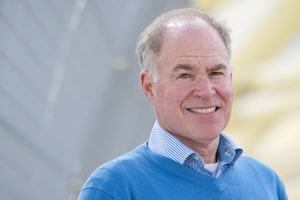
Sinn Fein's Mary Lou McDonald, left, and Michelle O'Neill address the media on the imminent return of the Northern Ireland Government at Stormont, in Belfast, U.K. on Jan. 30.Charles McQuillan/Getty Images
She grew up in a family with strong ties to the Irish Republican Army and spent nearly 20 years campaigning for Northern Ireland to break free from the United Kingdom. Now Michelle O’Neill is set to make history by becoming the first republican to serve as Northern Ireland’s first minister.
Ms. O’Neill’s appointment, which is expected to be confirmed on Saturday, illustrates just how far she and her party, Sinn Fein, have come since the dark days of the Troubles, when sectarian violence tore Northern Ireland apart and Sinn Fein faced restrictions because of its links to the IRA.
It has since become the largest party in the Northern Ireland Assembly, and last year it won the most local council seats for the first time. Sinn Fein is also the second-largest party in the Irish Republic parliament, and polls show it could win the next election there and form a government.
Saturday “will be a momentous day,” said Jonathan Tonge, a professor of politics at the University of Liverpool. “In terms of symbolic importance it can hardly be overstated.”
In many ways, Ms. O’Neill has succeeded because she represents a break from Sinn Fein’s past. She and the party’s president, Mary Lou McDonald, who leads Sinn Fein in Ireland, are the first senior officials who’ve had no involvement with the IRA and who grew up as the Troubles were ending. Both women – Ms. O’Neill is 47 and Ms. McDonald is 54 – have also broadened the party’s appeal beyond hard-core republicans by focusing on issues such as housing, health care and education.
Ms. O’Neill’s background as a working-class mother who had her first child at the age of 16 has also resonated with many voters. Since becoming the party’s Northern Ireland leader in 2017, she has championed causes such as gay marriage and abortion rights. And she made headlines last year by attending the coronation of King Charles.
Dr. Tonge said Ms. O’Neill hasn’t moved away from Sinn Fein’s long-term objective of establishing a united Ireland. “But in the meantime, I think Michelle O’Neill recognizes that there still aren’t enough nationalists in Northern Ireland. There’s only about 40 per cent of the population voting nationalist. To get towards the holy grail of a united Ireland, you’ve got to win over that section of the population who are neither unionists or nationalists.”
As she takes up her new position, Ms. O’Neill faces a host of challenges that could derail her ambitions.
Northern Ireland’s power-sharing government is notoriously unstable and prone to boycotts from nationalists and unionists. Since the 1998 Good Friday Agreement ended the violence and created a system of government that relies on cross-community co-operation, the assembly has been suspended more than one-third of the time.
Members of the Legislative Assembly haven’t convened since the May 2022 election, when Sinn Fein won the most seats, because of a standoff with the Democratic Unionist Party, the largest British nationalist party.
The DUP has been balking at post-Brexit trade rules, which the party argues force Northern Ireland to align its regulations with the European Union in order to keep the border open with Ireland, an EU member. As a result, the measures cut Northern Ireland off from the rest of the U.K., DUP leaders say, and could lead to greater integration with Ireland.
The party’s intransigence has prevented Ms. O’Neill from being confirmed by MLAs as first minister. By law the DUP and Sinn Fein share the posts of first minister and deputy first minister (one unionist and one nationalist), which are allocated based on seat totals. While the positions carry equal powers, the symbolism is important and Sinn Fein has never held the first minister job.
The DUP ended its standoff this week after the British government and the EU agreed to ease the flow of goods shipped to Northern Ireland from the rest of the U.K. The DUP’s leader, Jeffrey Donaldson, also said the party would end its boycott of the assembly, clearing the way for MLAs to meet as early as Saturday.
Still, it’s far from certain that the two leaders and their parties will be able to work together. Mr. Donaldson is already facing criticism from ardent unionists who remain opposed to the trade arrangements, and many DUP members are uneasy about the optics of Ms. O’Neill serving as first minister. The new governing executive will also have to agree on a legislative program and make up for two years of inaction.
Despite the challenges, both leaders could derive political benefits from making the assembly work. For Ms. O’Neill, it would be a sign that Sinn Fein can govern and could bring stability to a united Ireland. For Mr. Donaldson, a functioning government could strengthen his argument that Northern Ireland can be a productive part of the United Kingdom.
However, Katy Hayward, a professor of political sociology at Queen’s University in Belfast, said both leaders must be mindful that the majority of voters care far less about Irish unification and worry more about the economy and public services.
“This will be an interesting test for the new executive as to how they manage a situation in which Sinn Fein is more confident that things are going in its direction, and the DUP is much more cautious and still wary of compromise,” she said.
 Paul Waldie
Paul Waldie